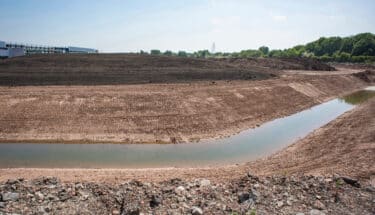Thank you for the opportunity to testify on Senate Concurrent Resolution No. 43, which seeks to amend our state constitution to provide a right of the people to a clean environment. My name is Ray Cantor, and I am the Deputy Chief Government Affairs Officer for the New Jersey Business & Industry Association.
This proposed constitutional amendment seems simple. It provides: “every person has a right to a clean and healthy environment, including pure water, clean air, and ecologically healthy habitats, and to the preservation of the natural, scenic, historic, and esthetic qualities of the environment.”
Mom and apple pie. Who could oppose such a straightforward and simple statement of environmental rights? But we all know that the protection and restoration of our environment is not a simple or straightforward path. We all know that there are complexities, balances, compromises, and tradeoffs. That is why NJBIA opposes this proposal.
There is no doubt that when this country and this state developed, especially during its early industrialization period, that the environment was ignored. Worse, in many areas it was literally trashed. Wetlands were routinely filled in, hazardous chemicals dumped, and forests destroyed. The air was hazardous to breathe.
In response to these and other problems, the modern environmental movement began in the early 1970s with the founding of the Environmental Protection Agency and, in New Jersey, with the creation of the Department of Environmental Protection. Early environmental laws were aspirational, but pragmatic. The Clean Water Act called for the elimination of all water pollution but recognized the limits on technology, so it allowed discharges set at “acceptable” standards, based either on ecological or health standards or, in many cases, technological or cost factors.
Nearly all the environmental laws passed over the last fifty years have made similar tradeoffs because we all recognize and accept that any human activity has impacts on the environment. The question for policymakers is are the benefits of an activity worth the impacts.
That is what the Legislature, and this committee, has been doing for the last fifty years and what the DEP has been doing as well. There has been a recognition that our economy, our need to live, work, and prosper all require environmental tradeoffs. It is a necessity for human flourishing. Humans are part of this equation as well. We don’t live in a green paradise where the birds and other wildlife are not impacted by human activity. They necessarily are. The question is balance and values.
What this simple so called “green” amendment does is take those decisions away from this body. It is crafted on the premise that the Legislature cannot be trusted to protect the public and make the right decisions. It seeks to go around the Legislature, and the Governor and Executive Branch as well, and allow any person to go to the courts to get the result they want. Passage of this amendment is a deferral of policymaking from the elected branches to the non-elected Judiciary.
But isn’t it good for citizens to be able to go to court to preserve the environment? What could go wrong? What is wrong with a constitutional guarantee of a clean environment? Nothing, so long as you don’t allow humans in the equation. Let me give a few examples of what to expect if this becomes a constitutional provision.
- Would any warehouse, office, or housing development be able to be built if challenged under this “green amendment”? The uncertainty alone will be enough to deter many developers from even trying to build anything new in New Jersey. Who would provide financing for a project subject to a court ruling on a vague constitutional standard with no underlying statute or regulations?
- What about a road or public infrastructure project or a recycling or food waste project?
- What about wind energy? Would offshore wind meet a “pure water” or “preservation of the natural, scenic, historic, and esthetic qualities of the environment” test once it is enshrined in our constitution?
- What if Trenton wanted to demolish a dilapidated, old factory to make way for a new manufacturing facility that promised to bring hundreds of good paying jobs to the capital city? Would that violate the historic preservation guarantees?
- What if DEP decides not to regulate a contaminant because it falls below the legislatively set threshold for risk or otherwise does not meet statutory or regulatory established criteria for setting a standard? Inaction is clearly subject to court review as well.
I would venture to guess that all these projects, and, in reality, any project or activity would be vulnerable to being rejected by a judge under this constitutional amendment because the simple test being put forth is not balanced, does not take into account other considerations, and, worst of all, is unpredictable.
We cannot really answer these questions because the fact of the matter is we really do not know what it means or how it will be implemented. No assurance given by any advocate for this amendment nor any legislator will make any difference to a judge hearing a claim brought forth by any person trying to stop the development or activity de jure.
This constitutional amendment is an abdication of legislative and regulatory authority to the judicial branch. It says that the Legislature no longer wants to be the arbiter of what should or should not be allowed but that we want the courts to decide complex policy issues based on an aspirational constitutional amendment. That is not how our system of government works and it is not how it should work.
We elect both legislators and the Governor to serve the policymaking function. There is debate, there is compromise, there are hard choices. All sides are represented, as this committee today so clearly demonstrates. Representative democracy works. Sometimes it is messy sausage making, sometimes we don’t get what we want. But at the end of the day, we make progress. And if we don’t like the results, we have elections.
The clean water and clean air acts have dramatically improved our environment and it continues to improve. New Jerseyans drink some of the cleanest and safest water in the world. Our ocean waters have not been this clear and full of marine life in well over 100 years. Our forests are coming back and we have protections in place for wetlands as well as the Highlands and Pinelands. We have preserved over one million acres of land and, thanks to Senator Smith’s and this body’s work, more will be preserved every year. Our contaminated sites are being cleaned up and restored at a record pace. I would venture to say that the Legislature and the Executive Branch have done a pretty good job of helping to clean up and restore the Garden State.
We do not need to turn these critical decisions over to the judicial branch which lacks the knowledge, time, institutional processes, and accountability to address environmental problems. While I am often here speaking against bills this committee puts up, I would rather make my case here, before this committee, than in a courtroom. I urge this committee to maintain its authority over environmental policy and not to release this concurrent amendment.





